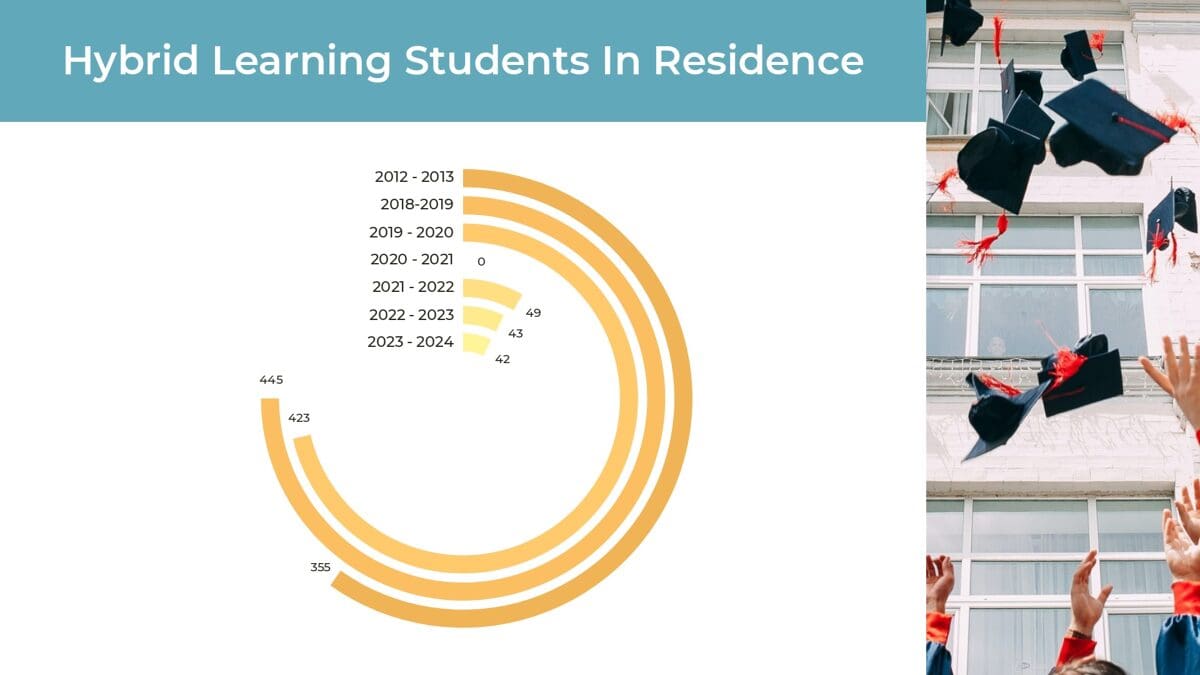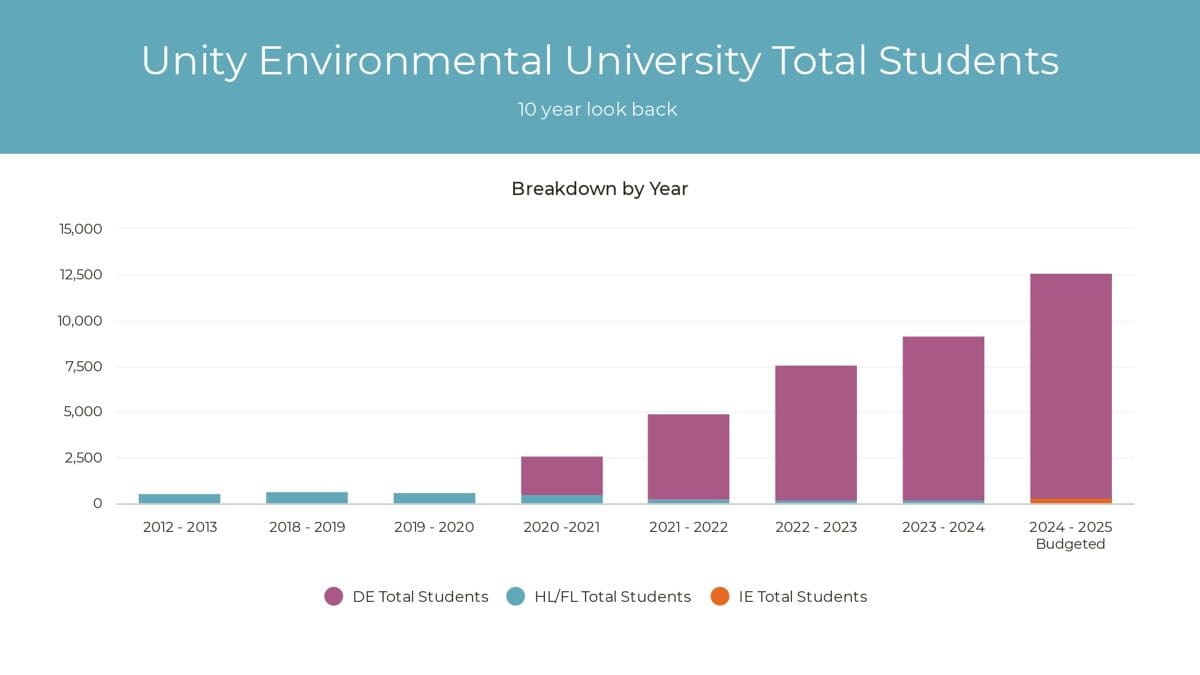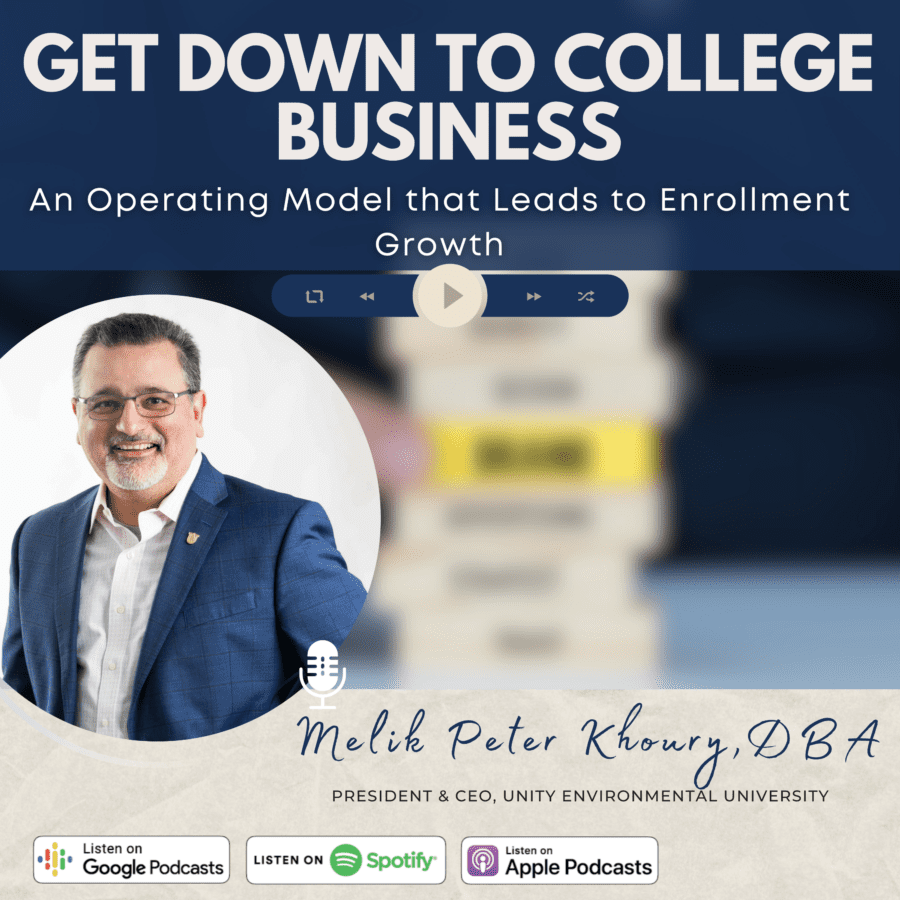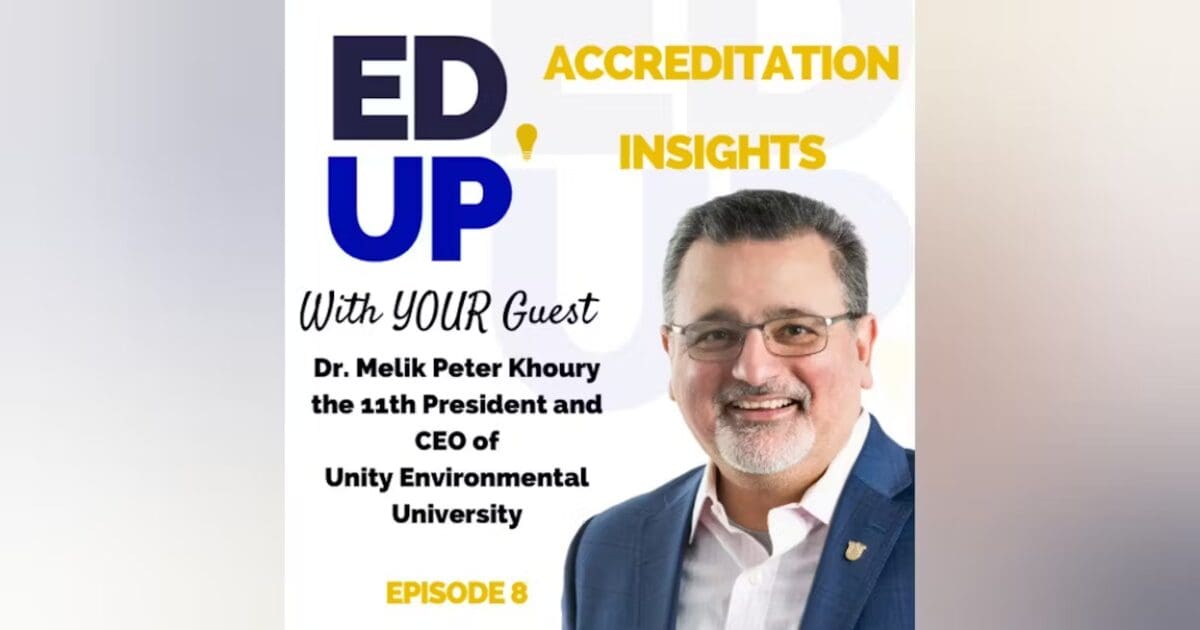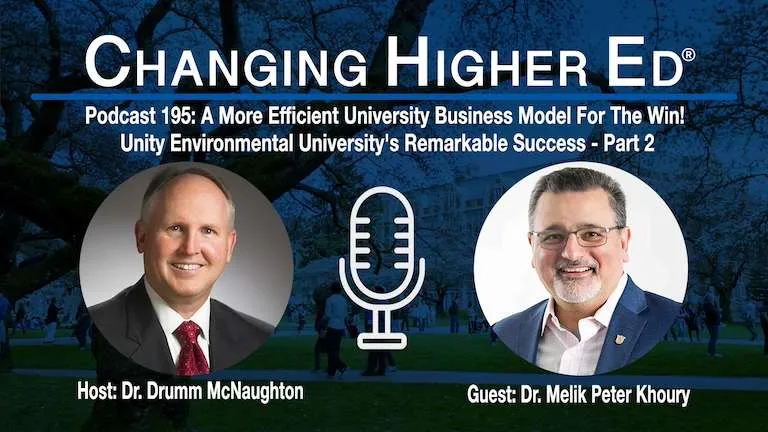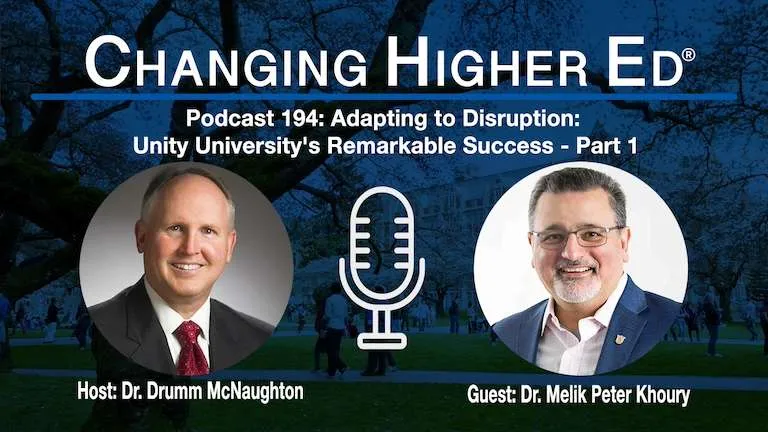
Office of the President
A Message from the President
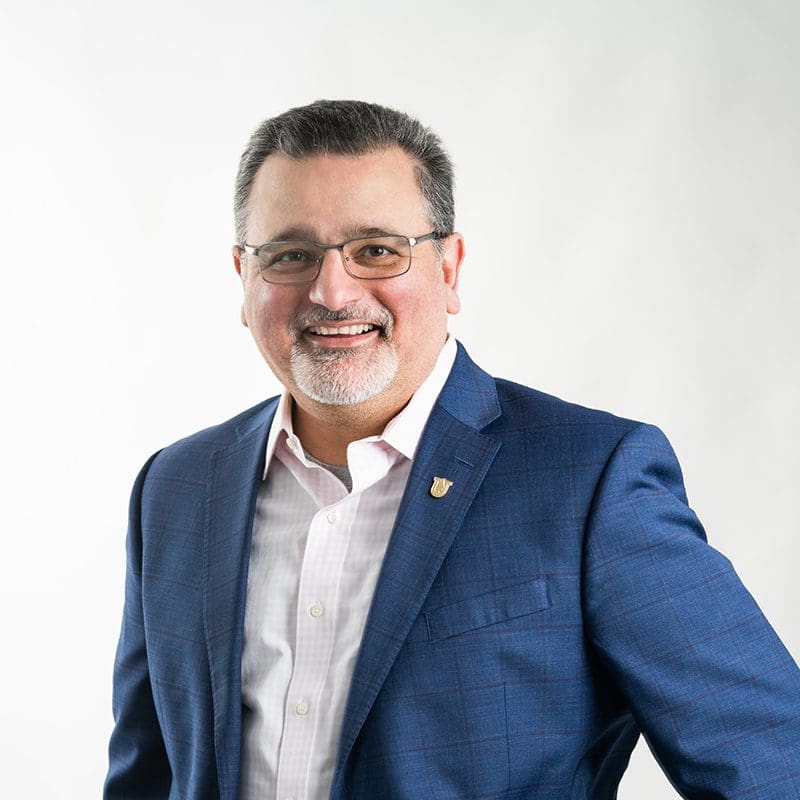
July 12, 2024
As the President of Unity Environmental University, I have witnessed firsthand the shifting landscape of higher education, particularly for non-Tier 1 small private residential colleges. The GI Bill, initiated in 1944, led to a surge in college enrollments by providing educational benefits to World War II veterans. This shift made higher education more accessible to a wide range of learners and no longer exclusive to more affluent families, as students from diverse backgrounds began pursuing degrees. However, colleges are now facing challenges due to the demographic cliff, a significant decline in the college-age population, resulting in lower enrollment rates and financial instability within the sector.
The closure of Green Mountain College in 2019, a peer environmental residential college in rural Vermont, serves as a stark reminder of the precarious position many small, non-selective institutions find themselves in today. Despite its vital mission and commitment to environmental stewardship, Green Mountain could not sustainably offer the intimate college experience at a price level that attracted sufficient students to its rural campus. This unfortunate closure was a harbinger of a broader trend that we must address collectively as educators, administrators, and society at large. Today, what was once a trickle of college closures and layoffs is now a tsunami, with multiple institutions closing regularly.
The value of a small college experience is clear, offering personalized attention, close-knit communities, and opportunities for unique learning pedagogy that are often difficult to replicate. At Unity, we’ve seen how this approach has fostered deep engagement with critical issues like environmental sustainability and social responsibility. However, the financial realities of maintaining such an experience today are becoming increasingly challenging. We have reached a point where it seems as if one small, financially struggling college per week is now announcing its closure, with many others announcing mass layoffs and program cuts.
Unity’s own journey reflects the broader challenges facing small residential colleges. After the pandemic emergency subsided, the board, select members of my team, and I remained deeply committed to our residential campus in rural Maine. However, we observed a significant shift in student preferences, with many former residential students opting to complete their degrees through our growing distance education program instead of returning to campus. This shift in preferences had significant implications for our operations.
Unity’s original cornerstone residential semester-based education program has failed, despite the advantages of a beautiful, well-maintained campus, devoted alumni, and dedicated staff and faculty.
If the institution had not invested in and supported an innovative distance education arm prior to the pandemic, Unity College would have closed. Instead, Unity Environmental University has risen to the 21st-century challenge of providing meaningful education and training to citizens whom we will depend on to meet the greatest sustainability challenges in our lifetimes.
Like many of our peers, Unity also struggled in the last few years to attract more first-year students to our original campus in central rural Maine. This year, given the realities that not enough students were choosing the full-time residential experience to cover the actual cost of providing that education, we faced the difficult decision to shutter our 225-acre campus and relocate the remaining and future residential students to our smaller teaching location in Southern Maine. This move, while understandably disappointing to many alumni and to those in the local community, allows us to respond to changing student needs and preferences while remaining true to our mission and continuing to provide quality education in environmental fields.
The path forward for small residential colleges will require creativity, adaptability, and a renewed commitment to our core mission. This may involve developing innovative funding models, reimagining curriculum delivery, and forging new partnerships with industry and community organizations. For Unity, a change in our governance model has allowed us to do these things while adjusting at a rate that allows us to keep up with rapidly changing student needs. While I expect that some small residential colleges will survive through the support of policymakers, philanthropists, and the broader public, it has become clear to me and Unity’s board that students’ preferences have fundamentally changed to the point where many more colleges will fail if they are unable to transform.
My board, my employees, and I have been and remain determined to make Unity’s offerings available to a much larger group of diverse students of all ages who are living and working in their own communities across the US. Let me be clear – we have not abandoned residential education, but we are now developing alternative low-residency options that may better meet the demands of today’s students for more flexible and affordable education. Instead of burdening the institution with the high costs of running a resort type university that essentially operates as its own town, we have moved to a campus in Southern Maine that already operates as its own economy. This allows us to bring in students and give them a worldclass in-person education at much lower overhead.
As a CEO, it is always painful to lead an organization during a time when the market moves in a different direction, forcing us to discontinue a long-beloved offering, despite incredible efforts by many dedicated employees to save it. However, it is our students who are freely making the choice about how and where they will invest their resources in their higher education path, and so to best meet our mission, Unity has had to adjust to this new reality and offer environmental programs and modalities that students want and can afford.
We could have taken the path of some of our struggling peers and reduced operations to support a much smaller cohort of students who could still afford the time and significant cost to reside at a rural four-year college. That is a choice more small private colleges may decide to make. But we chose instead to boldly focus on our goal of accessibility and scalability, to consider how best to expand rather than shrink educational opportunities in environmental sustainability.
Small private institutions of higher education play a crucial role in shaping the future of our society, yet many face unprecedented financial challenges that threaten their very existence. Unlike other institutions that have chosen to shrink, or cling to traditional residential delivery models, Unity recognized early on the need to scale, and change how we provide learning opportunities in order to remain relevant and sustainable. To extend the evolution metaphor, the diversity of our educational offerings; specifically, the robustness of our online programs; has enabled us to evolve and thrive where many of our peer institutions have not survived. Unity’s commitment to environmental education remains unwavering, but our continued survival depends on our ability and willingness to continually reimagine how we meet the changing needs and preferences of our students and the world they will shape.
Our enrollment numbers; currently more than ten times the level of our residential college at its peak; tell us we are succeeding. This May, we graduated more students than in any year in our history, and each of those graduates had an inspiring story of transformation and commitment to tell.
Unity Environmental University stands as a testament to resilience and adaptability in the face of challenges. With an impressive 90% of graduates securing careers upon graduation, our impact is undeniable. We empower a diverse student body, where half are first-generation college students, and our multicultural student population has flourished, reaching 25% from a historic average of 8%. These figures are a powerful testament to our commitment to inclusivity and the success of our students. As we navigate this evolving landscape, our dedication to providing accessible, high-quality education remains unwavering. We empower our students to address the critical sustainability challenges of our time.
As we look forward to the 2024-2025 academic fiscal year, Unity Environmental University stands ready to embrace the future with optimism and determination. Together, through innovation and unwavering commitment, we will ensure Unity’s mission endures for generations to come. We remain dedicated to fostering a community that values environmental stewardship, social responsibility, and academic excellence. Our journey is one of adaptation and resilience, and with the support of our students, faculty, staff, and alumni, we will continue to thrive and lead the way in environmental education.
Thank you for your continued support and belief in our mission. Here’s to a bright and promising future for Unity Environmental University and all who are part of our ecosystem.
With pride,
Dr. Melik Peter Khoury
President & CEO,
Unity Environmental University

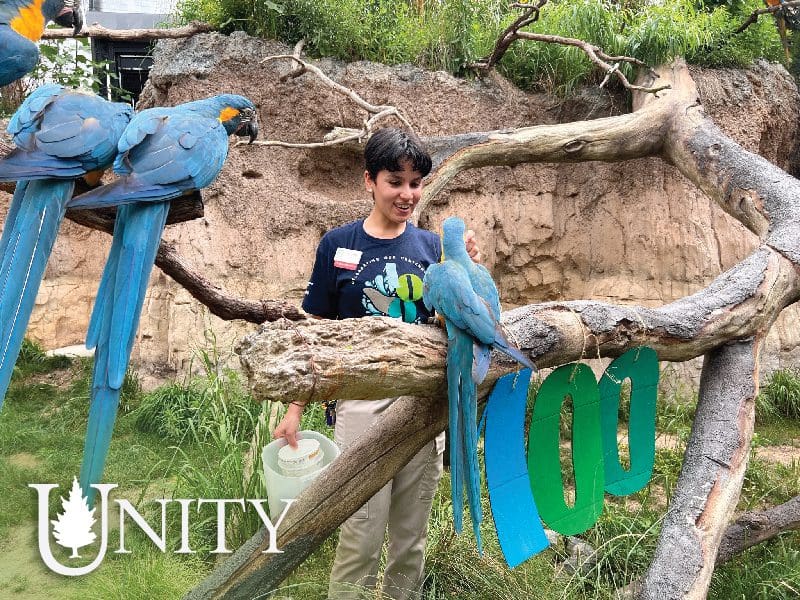
An Online Pivot Pays Off
“In fall 2012, Unity College had fewer than 600 students. Now, a decade and a name change later, Unity Environmental University counts more than 7,500 students. Administrators attribute the explosive enrollment growth to a hard online pivot centered on high-demand environmental programs.”
“What we realized is our mission as an environmental institution and our curriculum was very relevant for the 21st century, but we really only served one audience well, which was residential, coming-of-age high school graduates in a very traditional approach.”
–Dr. Melik Peter Khoury
https://lnkd.in/e3fByshq
Hear Dr. Khoury discuss the current state of higher education and its future:


